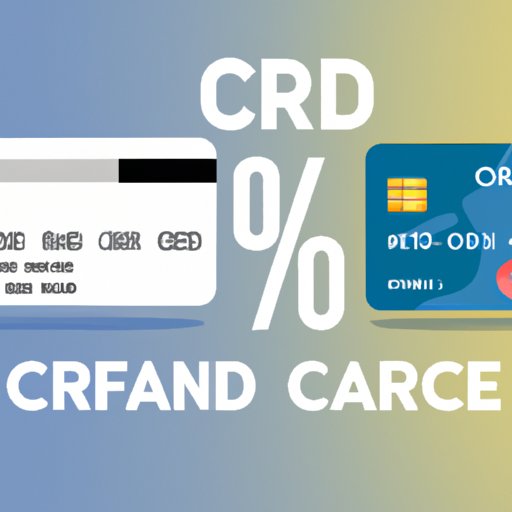Introduction
Credit card finance charges are fees that credit card companies charge for borrowing money or for using a credit card. These charges can be charged as an annual fee, a late fee, an over-the-limit fee, or as interest on purchases. Knowing how credit card finance charges work and how to avoid paying excessive fees can help you manage your finances more effectively.

Exploring the Basics of Credit Card Finance Charges
Credit card finance charges can vary depending on the type of credit card and the terms of the agreement between the cardholder and the credit card company. It is important to understand the different types of credit card finance charges so you can make informed decisions about credit cards.
What are the Different Types of Credit Card Finance Charges?
Annual fees are one of the most common types of credit card finance charges. These fees are typically charged on an annual basis and can range from $20 to hundreds of dollars. Late fees and over-the-limit fees are also common types of credit card finance charges. These fees are usually charged if the cardholder does not make the minimum payment by the due date or if the cardholder exceeds their credit limit. In addition, interest charges can be applied to purchases made with a credit card. Interest rates can vary widely depending on the type of credit card and the terms of the agreement between the cardholder and the credit card company.
How Credit Card Companies Calculate Finance Charges
Credit card companies typically use an average daily balance method to calculate finance charges. Under this method, the credit card company adds up all of the balances each day during the billing cycle and then divides it by the number of days in the billing cycle. The resulting figure is the average daily balance and is used to calculate the finance charges. Credit card companies may also use other methods to calculate finance charges such as the adjusted balance method or the previous balance method.
Regulations Surrounding Credit Card Finance Charges
The Credit CARD Act of 2009 established several regulations that credit card companies must follow when calculating and charging finance charges. For example, credit card companies are required to provide cardholders with 45 days notice before increasing the annual percentage rate (APR) on the account. Additionally, the Credit CARD Act prohibits credit card companies from charging certain types of fees such as over-the-limit fees and late fees unless the cardholder has been given reasonable opportunity to pay the amount due.

How to Avoid Paying Excessive Credit Card Finance Charges
Understanding interest rates and credit card finance charges can help you avoid paying excessive fees. Here are some tips for reducing credit card finance charges:
Understanding Interest Rates and Credit Card Finance Charges
Before signing up for a new credit card, compare the interest rates and fees offered by different credit card companies. Make sure you understand the APR, the annual fee, and any other fees associated with the card. Also, read the fine print carefully and ask questions if there is anything you don’t understand. This will help you find the best credit card for your needs and help you avoid paying excessive finance charges.
Tips for Reducing Credit Card Finance Charges
Make sure to make all payments on time. Late payments can result in hefty late fees and higher interest rates. Additionally, try to pay off your balance in full every month. This will help you avoid interest charges and help you keep your credit score in good standing. Finally, consider transferring your balance to a credit card with a lower interest rate or a card with a 0% introductory APR. This can help you save money on interest charges and reduce your overall credit card debt.
The Pros and Cons of Credit Card Finance Charges
Credit card finance charges can be beneficial in some cases, but they can also be costly if not managed properly. Here are some advantages and disadvantages of using credit cards with low finance charges:
Advantages of Using Credit Cards with Low Finance Charges
Low finance charges can help you save money on interest charges and annual fees. Additionally, using credit cards with low finance charges can help you build a strong credit history and improve your credit score. Finally, some credit cards offer rewards such as cash back or travel points which can help you save money on future purchases.
Disadvantages of High Credit Card Finance Charges
High finance charges can add up quickly and can lead to expensive debts. Additionally, if you miss payments or exceed your credit limit, you may incur additional fees. Finally, high finance charges can hurt your credit score and make it difficult to get approved for loans or other forms of credit in the future.
Conclusion
Credit card finance charges can be costly if not managed properly. However, understanding how credit card companies calculate finance charges and taking steps to reduce them can help you save money and improve your financial health. It is important to research different credit cards and compare the interest rates and fees before signing up for a new card. Additionally, making payments on time and paying off your balance in full each month can help you avoid paying excessive finance charges.
Summary of Key Points
Credit card finance charges can include annual fees, late fees, over-the-limit fees, and interest charges. Credit card companies typically use an average daily balance method to calculate finance charges. The Credit CARD Act of 2009 established regulations that credit card companies must follow when calculating and charging finance charges. Understanding interest rates and credit card finance charges can help you avoid paying excessive fees. Additionally, making payments on time and paying off your balance in full each month can help you reduce credit card finance charges.
Final Advice for Managing Credit Card Finance Charges
Before signing up for a new credit card, compare the interest rates and fees offered by different credit card companies. Additionally, make sure to make all payments on time and consider transferring your balance to a credit card with a lower interest rate or a card with a 0% introductory APR. Finally, if you are unable to pay off your balance in full each month, consider setting up automatic payments to ensure you do not incur any late fees or other finance charges.
(Note: Is this article not meeting your expectations? Do you have knowledge or insights to share? Unlock new opportunities and expand your reach by joining our authors team. Click Registration to join us and share your expertise with our readers.)
